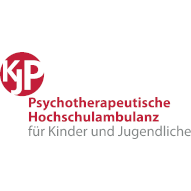
Psychotherapy
Outpatient Teaching and Research Psychotherapies at the University Outpatient Centre for Children, Adolescents, and Their Families
Beyond the psychotherapeutic consultation hours we offer acute psychotherapeutic treatments as well as short-term and long-term psychotherapies. In child and adolescent psychotherapy sessions are held with the child or adolescent as well as with their caregivers.
Since we have a teaching and research mandate in the University Outpatient Centre, we offer psychotherapies exclusively as teaching and/or research therapies. This means that all psychotherapies, which are admitted after a psychotherapeutic consultation are research therapies and/or take place under the supervision of therapy assistants (i.e. psychologists or psychotherapists in training). Further information on our teaching and research mandate can be found here.
Acute psychotherapeutic treatment
If an acute need for treatment becomes apparent during the psychotherapeutic consultation, acute psychotherapeutic treatment can be arranged. This is intended to contribute to the improvement of an acute mental crisis and to prepare for psychotherapy.
If capacities are available, acute treatment can be carried out directly in our outpatient centre. Alternatively, referrals are made to external centres with free places.
Psychotherapy (short-term or long-term therapy)
If there is an indication for guideline psychotherapy (short-term or long-term), this will be arranged by our outpatient therapists.
If there are free capacities, short-term or long-term psychotherapy can be carried out directly in our outpatient centre. Alternatively, referrals can be made to external centres with available places. Psychotherapies in our outpatient centre are conducted as teaching and/or research therapies. The focus of our outpatient centre is on short-term therapies.
Procedure of a teaching or research psychotherapy
In the following, we explain the administrative procedure of an outpatient teaching or research psychotherapy (short-term or long-term therapy) in our University Outpatient Centre:
Psychotherapeutic Consultation
The first step towards a teaching or research psychotherapy in our University Outpatient Centre is an appointment in the psychotherapeutic consultation hour. It is possible to make an appointment by phone or e-mail using these contact details.
Scope: There will be one or more consultation appointments lasting between 25 and 50 minutes. In order to start psychotherapy at least 50 minutes of consultation on 1-2 appointments are necessary. The consultation-hours take place with the participation of the child or adolescent and their caregivers.
Goal: During the psychotherapeutic consultation it is clarified whether a mental illness is present, whether psychotherapy is indicated, and which further support measures are suitable. If outpatient psychotherapy is indicated, if there are available places and if there is an interest of the patient and his caregivers, outpatient teaching or research psychotherapy can then be started with us. Alternatively, we will recommend external contact points for psychotherapy.
Probatory Phase
Scope: 2-4 probationary sessions ("getting to know each other" and trial sessions) of 50 minutes each take place. The probationary sessions take place with the participation of the child or adolescent and their caregivers.
Goal: The goal of the probationary phase for the patient and their caregivers and the therapist is getting to know each other and to establish a therapeutic relationship. Further diagnostic information is collected and a biographical and family anamnesis is collected. During the probationary phase a consultational report is obtained from the paediatrician or child and adolescent psychiatrist in order to rule out underlying physical or neurological disorders, which could explain the psychological complaints. Then, together with the therapist, therapy goals are formulated and a treatment plan will be created. In addition, during the probationary period an application for the costs of psychotherapy to be covered by your statutory or private health insurance or Beihilfe is made .
Therapy Phase
Scope: There are 12-80 sessions (depending on individual needs), usually 1x per week à 50 minutes, in case of severe illnesses or acute crises also up to 2x per week à 25-50 minutes. Short-term therapy initially comprises 12 sessions and can be extended to further 12 sessions to a total of 24 sessions, if required. Long-term therapy comprises 60 sessions and can be extended to 80 sessions, if necessary. After approximately every 4th session an additional appointment with the child's or adolescent's caregivers takes place.
Goal: During the therapy phase, your problems are treated using established and scientifically proven psychotherapeutic methods. The main focus of the University Outpatient Centre is behavioural therapy. The therapies are carried out by licensed psychological psychotherapists. In addition, therapy assistants will observe the therapies and carry out diagnostics and accompanying interventions. These are students in the master's/postgraduate programme in psychology or psychotherapists in training, who have a corresponding previous education (bachelor's or master's degree in psychology) and are, of course, also bound to professional confidentiality. For the purposes of quality assurance and research we will evaluate your course of treatment by means of diagnostic procedures. Further information on our teaching and research mission can be found here.
Follow-up Phase
Scope: 1-16 sessions of 50 minutes each take place at intervals of several weeks or months.
Goal: In order to prevent a relapse and to accompany the permanent integration of the learned strategies into everyday life, follow-up appointments are arranged at longer intervals after the end of the therapy phase.



